Eka Kevanishvili
Tbilisi-Nikozi-Tbilisi
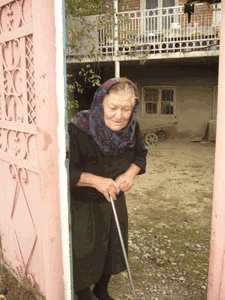 Special Reportage
Special Reportage
The head of the family of Giguashvilis is standing before their ruined and burnt house in the village of Tkviavi in Gori district. He is looking at the charred walls that remain as a remnant of what was their home. His wife, daughter-in-law and child are all waiting for us in the cattleshed that was recently cleaned up to set up housekeeping. A homemade electric space heater keeps the former cattle shed warn. It cost but only seven GEL. The homemaker is baking “Mchadi”. A boy of seven is sitting on the sofa-the only furniture that survived from the former home. “We will freeze out this winter,” said Natia Giguashvili in a whisper. There is a stack of firewood in the yard that was delivered by non-governmental organization; it is only enough for three weeks.
People returned to the villages in the Gori district ten days ago. A part of IDPs temporarily residing in kindergartens and public schools in Tbilisi, also those residing in tent towns have returned to their houses. IDPs from Georgian villages in Tskhinvali region are still homeless. Houses for these people are being built in Tserovani and Gori. The returnees found their houses either looted or burnt down. The lasting trace of Russians and Ossetians will remain in these villages for a long time to come.
We visited the villages of Karaleti, Tkviavi, Ergneti and Nikozi with the support of British Institute for War and Peace Reporting. It was kind of journalistic mission that was planned by IWPR in order to assess the actual situation in these villages. Georgian police accompanied us to the villages from Gori. We did not meet any cars besides Red Cross vehicles on our way to the buffer zone. We rarely saw locals in the street. There were children waving at police cars as they passed.
Karaleti
It is raining in Karaleti. Already autumn has arrived here and people can be seen transporting 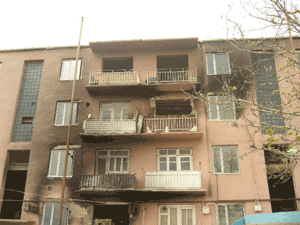 hay and firewood by small carts. The first person who we met in Karaleti is Giorgia Basharuli, a pupil in the fifth grade at school. He is running along the street. We stopped him and asked. “I am coming from school now. It is nice here; here is my house,” he said.
hay and firewood by small carts. The first person who we met in Karaleti is Giorgia Basharuli, a pupil in the fifth grade at school. He is running along the street. We stopped him and asked. “I am coming from school now. It is nice here; here is my house,” he said.
Locals approach us themselves. They have much to tell. The majority of residential houses have been burnt down in the village centre. We see a woman looking out of one of the windows; she is holding a broom. Here, people watch every newcomer. Villagers are gathered nearby and they are retelling the same stories over again as they have already retold several times before; they are not lazy to recall those same facts with journalists.
Nodar Tushishvili is 73; he did not leave the village at all. Only his children and grandchildren were evacuated. “We were in danger but what they could they do to harm old people. If they had killed us it would not have been a disaster. I have seen even worse during Patriotic War…” Nodar Tushishvili said that at least 25 houses are burnt in Karaleti. His house survived and complains about inadequate and poor level humanitarian aid in their village. Those villages that are more damaged than theirs get greater attention.
We met a unit from the Georgian ministry of defense in the village center. Locals are surrounding their car. The soldiers have the explosives they had found in the village. The commander Malkhazi (he did not say his surname) said that he is ordinary military person and plenty of explosives were dropped in Gori district villages. Demining process is still going on. Nearly 30 villages must be demined but only some of the villages have been cleared so far. Besides corresponding units of the defense ministry, villagers also take part in demining activities. People are warned to inform them if they should see any unexploded ordnance and to be careful and tell them if they detect any strange things. Houses, yards, roads and gardens are being cleaned of mines in the meantime but they could not tell long this process would take. However, they could not give an answer as how much time would be required time to complete the de-mining activities.
An old woman stepped forward from the crowd of people in front of the residential building. She is an Ossetian woman, Anastasia Bosikova. During the war she was guarding this district. “I was in the crossfire but I wasn’t afraid at all. I was asking Ossetian soldiers and attackers not to kill my Georgian neighbors; I urged them to kill me instead them. They burnt down my house; everything is looted. They even took away the cows.” Then Gia Gogiashvili approached us who had left the village only for five days. His house was not destroyed only window glasses are smashed and furniture stolen.
We are leaving Karaleti and driving to Tkviavi. People say that Tkviavi was more damaged than the previous village we visited.
Tkviavi
The number of burnt houses is greater here and.the streets are empty. We stopped in front of one family; the host is standing at the gate; there is no house anymore in this yard; the walls are half ruined and charred. Burnt furniture, smashed vessels, and a half-destroyed bicycle-everything is all mixed up.
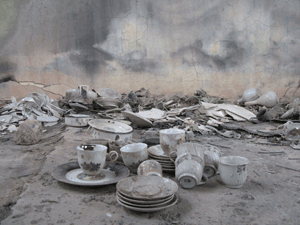 |
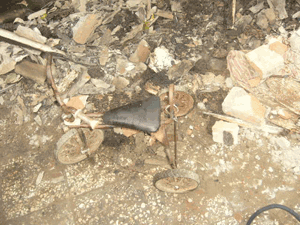 |
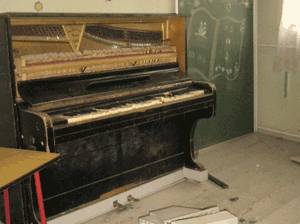 |
The head of the family cannot speak. Vazha Maradishvili, their neighbor and relative is now approaching us. Vazha still remembers how Ossetian harassers arrived there. “They rushed out of the cars and set the house on fire.” Vazha Mamardashvili is 55. He was hiding in the gardens along with his neighbors during the entire period of the military operations.
“When the bombardment started we ran; but otherwise we did not leave the district at all. Our ordeal lasted for 40 days. We either ran to the gardens or hid in the houses. We ate only that food that we could get in the house or gardens-tomato, bread, cheese, and peppers…they did not burn my house but looted it. They took TV set, video-recorder, DVD… but it is not disaster, we can overcome that loss but now I am very afraid after everything finished; I was not scared during the bombardment but now I am more scared.”
Natia Giguashvili, one of the owners of the burnt house met us in the cattle shed. “We have cleaned the shed and now we are living here; we could not do anything else.” The head of the family is sleeping here at night; children and women are sheltering at the neighbor house. Their total wealth consists of several plates and bowls, a sofa and an old bed. It is impossible to live in the shed not only in winter but in summer too. People say officials from the authorities have not visited them as yet.
The housewife said they had returned home on October 10. “How would you feel when you see everything burnt down in one hour that you have collected all your life? They supplied us with mattresses and bed clothing as IDPs and that is all our property to our name. We have neither plates nor anything else. We also do not have money.”
We entered the ruined house. The woman can hardly speak; she cannot help her tears and starts talking:
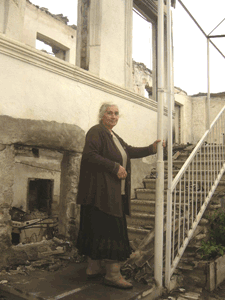 “There was peg here and a uniform of soldier was hanging on it. A friend gave it to my son as a present and when looters saw the uniform and they thought there were soldiers in this family. There is no sense to clean the area, as you see yourselves what a mess we experienced here. We had a hall here with a TV Set, a table, a sofa and armchairs here. They have taken away the oven and TV set. There was a cupboard here and chairs, a carpet here. On the other side we had two bed-rooms with Bulgarian furniture in them. There was a chest-of-drawers here and there was kitchen on the other side. We left the village on August 8 and arrived back on 10th but they started to bomb the village within one hour later and we ran away again. More than 40 houses are burnt in this village.”
“There was peg here and a uniform of soldier was hanging on it. A friend gave it to my son as a present and when looters saw the uniform and they thought there were soldiers in this family. There is no sense to clean the area, as you see yourselves what a mess we experienced here. We had a hall here with a TV Set, a table, a sofa and armchairs here. They have taken away the oven and TV set. There was a cupboard here and chairs, a carpet here. On the other side we had two bed-rooms with Bulgarian furniture in them. There was a chest-of-drawers here and there was kitchen on the other side. We left the village on August 8 and arrived back on 10th but they started to bomb the village within one hour later and we ran away again. More than 40 houses are burnt in this village.”
An old woman is standing at the gate across the street. She introduces herself as Rusudan Chikhladze. She is pointing at the house that has bullet holes on the walls. “I did not leave the place. I was standing at the gate and greeting Russians to show to them that Georgians are also people. They were also greeting me. Ossetians attacked houses and took whatever they wanted. They had their car stopped here and was looking in my yard and searching for a car. If they had demanded the one I intended to show them my cart.”
The house of Tristan Kasabishvili is also burnt down to the ground. Men cannot speak openly; women are the most active. His wife, Neli said that officials had visited them; representatives of the NGOs also arrived here. They took photos of their house and granted it with the fifth category. She does not know anything other than that.
Nothing survived from our home. Nearly 600 books, plates and dishes, furniture.- everything is destroyed. Neli says they would never buy the lost items in the future.
There are bullet holes on the gate. In the past, children had painted sun and flowers in chalk on that place.
We met Levan Giguashvili when we left the family. He had spent fifteen days in a Tskhinvali prison. He left the town on August 27 when final hostages were exchanged. He tells mixed-up story; sometimes he cries, then stops and starts again.
“They spitted at us; made us bury dead people; the bodies were wrapped in cellophanes and 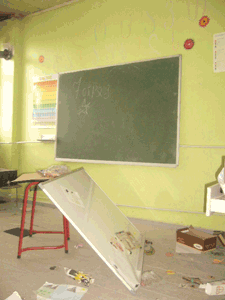 then we put them in the coffins. I do not know where they used to take those coffins. We cleaned streets; exchanged products. Old people of 85 also were with me. Ossetians used to come and beat us in order to get some reaction from us. Nobody resisted them, as we were all scared…”
then we put them in the coffins. I do not know where they used to take those coffins. We cleaned streets; exchanged products. Old people of 85 also were with me. Ossetians used to come and beat us in order to get some reaction from us. Nobody resisted them, as we were all scared…”
Ergneti
Georgian police patrols in Ergneti. Ossetian militia is standing 400 meters away; they can see each other. Police officers say that they hear gun-fire at nights. “If they do not stop firing we also fire back.” Tskhinvali is very close from here and we can even see residential buildings.
“Do not stand on the road; if they saw anybody moving, they might shoot,” police officers warned us. The houses standing nearby have bullet lodges. Some of them do not have roofs. Ergneti public school is seen in the distance; the building is completely destroyed.
“June 16”-the phrase is still on the blackboard. There is timetable below it. “Russia is Power” (it was in Russian) is written on another blackboard and nobody has rubbed it out. A broken computer is on the floor; text-books of Georgian literature and Math are scattered on the floor. The piano is broken but nobody touched the icons.
We then leave Ergneti. People in this village are also living with the hope that somebody will assist them before the arrival of winter. “Are not you afraid?”This question comes to the mind and there is reply from locals: “We prefer to live in our houses!”
Nikozi
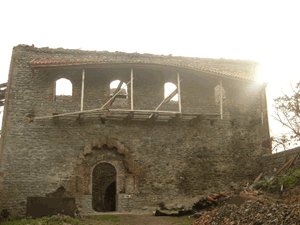 The Church in Nikozi is now just being repaired. The palace of the Episcope is completely destroyed. The ruins can be seen all around. A burnt and upset military vehicle is at the entrance to the church. Nuns are in the church. They clean the building of the debris. Part of one wall has already been constructed. There is a small police checkpoint nearby. Tskhnvali is also easy to see from from this place.
The Church in Nikozi is now just being repaired. The palace of the Episcope is completely destroyed. The ruins can be seen all around. A burnt and upset military vehicle is at the entrance to the church. Nuns are in the church. They clean the building of the debris. Part of one wall has already been constructed. There is a small police checkpoint nearby. Tskhnvali is also easy to see from from this place.
Complaints of the people in Nikozi are the same as in other villages. They expect when destroyed and burnt houses will be reconstructed. They live tense and peaceful lives; their sleep is sober.
“We have returned here. But what will those people do whose villages are completely destroyed?” asked the residents of Nikozi.
Georgian villages- Tamarasheni, Kekhvi, Kurta and others in Tskhinvali region are not controlled by Georgian police. We do not know what is going on there. We do not know how long will it take us before we can visit those villages?



